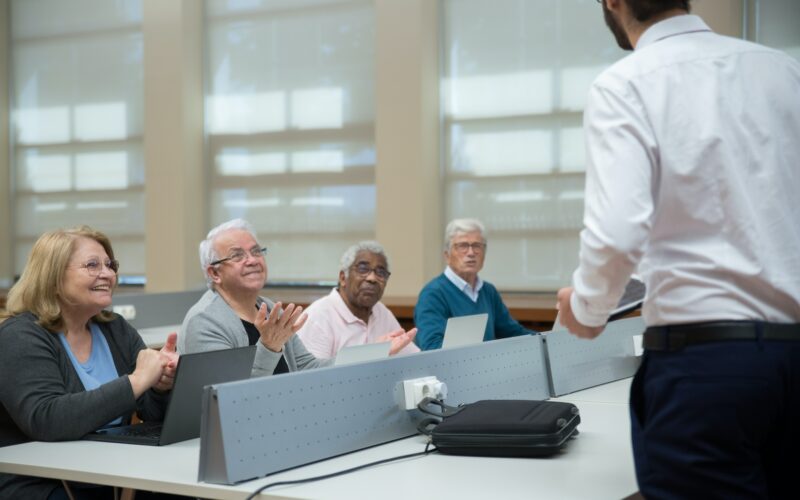Meeting the Challenge of Online Learning Disparities for Adult Learners

At CORE, we asked ourselves, “if not now, when?”
by Donna Walker James
Issues of digital disparity have never been so stark. Just logging into a home computer and working from home is now so obviously a luxury reserved for those with broadband, a computer, and the right skills to have one of those work-from-home (WFH) jobs.
The shutdown of our regular services on March 13, caused by COVID-19, has allowed Computer CORE time for deep introspection as an organization as we work to build up the resilience of our adult students to enter and re-enter the workplace. We have done things we have never done before, taught classes we’ve never taught before, brought in new volunteers in different ways, and questioned long-standing practices. We have gotten to know our students better than ever before through introductions—and constant reintroductions—on Zoom. We’ve had a chance for students to Zoom chat and Zoom raise their hands to fully participate in conversations. We’ve even enlisted a creative writing instructor through a nonprofit called HEARD to let our students explore their own voices as they define and redefine their career goals. At CORE, we asked ourselves, “if not now, when?” We’ve found the courage—out of necessity—to act on changes that may have never come. And to experiment.
Here’s some information on our path to online/distance learning:
Waking up: The first step in this new era was to really wake up and realize we were not exempt from creating distance learning just because we specifically recruit students who lack basic computer skills, and, usually, lack computers too. As we looked around us, asked our local adult service agencies and literacy programs about their plans, and knew parents (including our students) were gearing up to move to online instruction, it was clear we had to do the same.
Providing laptops: Part of our prep work for online learning necessitated Computer CORE’s first ever online purchases of refurbished laptops for those of our students who had no computer whatsoever at home. These were delivered primarily in early April, with one-on-one hand-offs to students with gloves and masks in the parking lot outside our closed classrooms.
Observation and practice: Another step was observing one of our volunteers using both Zoom and Google Classroom by an experienced public school teacher who has always used Google Classroom even in her in-person classes. This volunteer helped build our confidence that it was possible to teach basic computer skills (Microsoft Word, Excel, and PowerPoint and, in fact, Google’s G-Suite as well) online. We “sat in” this class as the original cohort seamlessly transitioned from in-person to online classes. Then we saw the practice work again as a new online-only cohort was recruited, lent Chromebooks as needed, and went into action. Interestingly, the Zoom format also allowed for a sign language interpreter for one of the newly recruited students. I also convened multiple Zoom classes with our students to practice using Zoom prior to a full push for distance learning.
Convincing: The third step was to communicate individually with and then convene a Zoom meeting of the 45 volunteer classroom teachers who sign on to teach our students two days a week, three hours per day, for eighteen weeks, as well as all of our Saturday morning tutors. About 40 volunteer teachers, tutors, and former teachers participated in an online discussion about online instruction. While all did not chime in, three teachers expressed enthusiasm and three expressed strong reservations. Out of this meeting, a small group of teachers agreed to help CORE launch distance learning. A few new volunteers were also recruited.
Planning: A staff member and this group of distance learning teachers spent about two weeks in April preparing class titles, days, times, and lesson plans. Rather than following our standard basic computer skills and workforce skills curricula, the eleven classes created all reflect the personal skills and interests of the brave volunteer teachers willing to teach. Some of these brand new classes cover online learning itself such as netiquette on Zoom, standard safety practices, and using Office 365 and Google G-Suite. There is also a class on using your smartphone and one on virtual practice interviewing. Finally, there are pretty advanced classes on computing and coding with Python.
Implementation: Distance learning classes are announced on our website. They are primarily for our 95 students who were enrolled when classes paused. Concerned that classes might not fill up, we also invited all 2019 alumni and a few students from partner programs. Although we planned to cap classes at ten students and allow students to only take two classes, some classes have over 20 students and 7-10 students are taking multiple classes. Altogether, about 55 students are filling 195 slots in distance learning classes. Among other lessons learned, we are finding that many challenges of getting to class including the commute and some aspects of childcare are solved for students. These distance learning classes all started the week of May 4 and continue 6 to 9 weeks depending on the teacher. A CORE staff member is the Zoom convener and moderator for most of the classes (except the teacher who convenes class on Google Meet). We have also been learning WebX (another departure for us), particularly from a new group of online tutors from E*TRADE.
Next steps: Another round of distance learning classes will begin July 6 and last through the end of August. In addition, we will reconvene all the volunteer teachers who were active in March and offer lessons learned about distance learning, with the hopes of enticing more to try it out. Now we have classes for them to “sit in” on, recordings to watch, teachers to consult, and students who already know Zoom. While 44 of our current students are participating actively in distance learning, 51 are not. If additional online instructors are recruited, we can hold several very basic classes to bring these students along. New fundraising efforts are centering on buying another wave of computers if equipment access remains one of the barriers. Our inactive students have been unable to participate for several reasons: a few had the virus (thankfully, they have recovered), some have extremely low-level computer skills, and others have found the demands of work and childcare more than enough without having to worry about computer classes at this time.
The new normal: Our regular fall semester is planned to start September 8, the day after Labor Day. Our plan is to re-enroll all our spring 2020 students in the fall 2020 semester, with no registration requirements or new materials fees. We have invited back all the students and all the volunteers. We do not, of course, know if we can re-open the classrooms and—even after extensive cleaning and distribution of masks, etc.—so we have a few contingency plans in mind. For example, we may reduce class size to six students and have students attend on alternate days. Computer CORE is also likely to offer a hybrid of in-person and online classes not only this fall, but for all time going forward.
All our staff, volunteer teachers, and students have learned so much during these trying times. Now all the students will remember—with all the tech-savvy people in the world—the days and months when they first used Zoom! Our biggest lesson: being brave and flexible.

Donna Walker James became the Executive Director of Computer CORE in August 2019. Her background includes running a local workforce development program in West Philadelphia and years of policy work on School-to-Work connections and analyzing effective programs for young people. More recently she worked at Goodwin House and was Deputy Director of Senior Services of Alexandria and Acting Executive Director of Volunteer Alexandria. James earned both her B.A. in urban studies and M. Ed. at the University of Pennsylvania.
![]()
Donna Walker James
Executive Director,
Computer CORE
5881 Leesburg Pike, #204 Falls Church, VA 22041
(703) 931-7346, ext. 5
EIN #54-1968428

